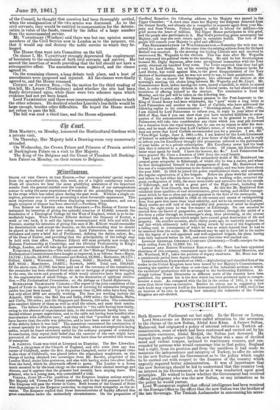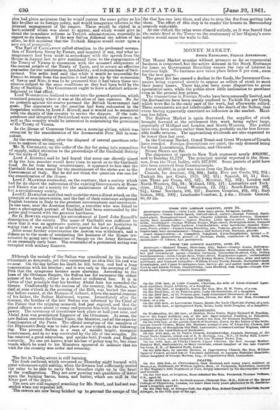POSTSCRIPT.
Both Houses of Parliament sat last night. In the Holm or Loans,
Lord STRATFORD DE REDCLIFFE called attention to the accession to the throne of the new Sultan, Abdul Aziz Khan. A former Sultan, Mahmoud, had originated a policy of internal reforms in Turkish ad- ministration, some of which had been continued and carried out by his immediate successor, Abdul Medjid, the Sultan just deceased. He learned from public report that the new Sultan was a man of decided mind and violent temper, inclined to reactionary courses, and sur- rounded by persons who would encourage him in that policy. England had a right, from its position and from the sacrifices it had made to maintain the independence and integrity of Turkey, to offer its advice to the new Sultan and his Government as to the policy which ought to be carried out with respect to the finances of the country which urgently required better administration. It was of importance that the new Sovereign should be led to understand that this country took an interest in his Government, so far as it was conducted upon good principles. He wished to know whether the Government had received official intelligence who was the new Sultan, or any intimation as to the policy_he would pursue. Lord WODEHOUSE replied that official intelligence had been received at the Foreign Office to the effect that the new Sultan was the brother of the late Sovereign. The Turkish Ambassador in announcing his acces- sfan had given assurance that he would pursue the same policy as his late brother as to foreign policy, and would inaugurate reforms in the internal management of the empire. These would be stated in -a hat-wheat* which was about to appear, and which would give in detail the immediate reforms in Turkish administration, especially in ..rel to its fivanees. If the new Sultan followed the advice of his allies, he felt oonfident that:the Turkish Empire would enter upon a new era of prosperity. The Earl of UARNARTUN valied attention to "the prolonged 'enerva- tion of Northern Savoy by France, and inquired if any, and-what-ar- rangements lad been made in accordance with the speech from the throne inAugust last to give continued force to the engag.ements of the Treaty of Vienna in connexion with the a cqnmed obligations of the,seeoW article of the Treaty of Turin, and to secure an effective guarantee for the maintenance, inviolability, and independeocie of Swit- zerland. The noble lord said that while it might be impossible for France to reoede from the position it had taken up by the connexion of Savoy and Nice, it was to be presumed that it had taken those ter ritories subject to the same conditions es they had been held by the King of Sardinia. -Our Government ought to have a distinct aekcoW- lwigiuent to that effect. Lord WODEHOUSE declined to enter into the generalquestion, which, remained precisely where it was at the close of last summer. 6o far as protests against the course pursued the British Government had goes. The argunsents on the question had beer exhausted in the dches written by Lord .J. Russell, and it would not be consistent the dignity of this country to revive the ,dispute. If the inde- pendence and integrity of Switzerland were attacked, other powers as well as this country would be interested in maintaining the provisions of the Treaty of Vienna.
In the House of Commons there was-a morning sitting, which was occupied by the consideration of the Irremovable Poor Bill in com- mittee.
At the-evening sitting, after the disposal of several questions rela- tire to -matters of no interest, %r. B. CocnitANE, on the order of the day for going into committee of supply, called attention to the proceedings of the Garibaldi Society for the unity of Italy.
Lord J. Russets, said he had hoped that some one directly-aimed qtly the lion. member would have risen to speak as to the Garibaldi fu sal So far from being revolutionary, it appeared to him that the Garibaldi fund was meant for the maintenance of the Rtatake quo in the Government of Italy. But he did not think the question was one for the consideration of the House.
Lord J. Marassais contended, on the contrary, that a society -which had for its object the subversion of the existing Governments at Rome and -Venice was not a society for the maintenance of the slat= quo, but a revolutionary society. Lord C. HAMILTON said that such societies were a direct attack-on the principle of non-intervention, and the fact of their existence subjected _English tourists in Italy to the greatest inconvenience and annoyance. Insane ease, near the Austrian frontier, a traveller who was found to have a photograph portrait of Garibaldi had -been surrounded by the police and treated with the greatest harshness. Sir G. BOWYER expressed his astonishment at Lord John Russell's description of the society. The name of Garibaldi was sufficient to show that it was anaggressive society, and he had no hesitation in saying that it was guilty of an offence against the laws of England. Aftersome further conversation the motion was withdrawn, and a debate as to the mode of conducting the busineas of the House ter- minated by going into Committee of Supply on the Army Estimates, at on unusually early-hour. The remainder of a _protracted sitting was occupied with military finances.































 Previous page
Previous page